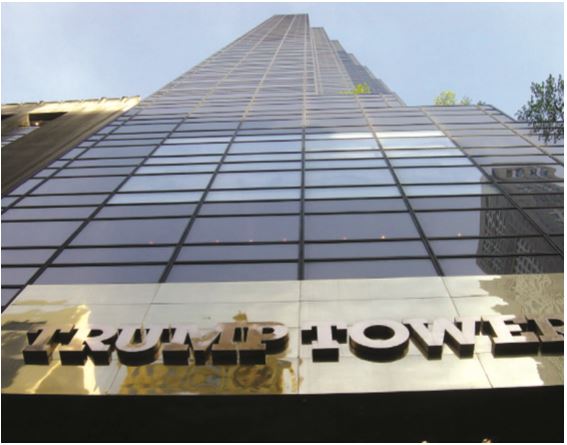Americans are concerned by Trump’s Russian links

The Trump administration is suspected of having ties to Russian politicians and business leaders. Photo Courtesy of Wikimedia Commons.
Hollywood has a knack for the outlandish.
In the 1962 film “The Manchurian Candidate,” Frank Sinatra’s character Maj. Bennett Marco uncovers a chilling Soviet plot to install a Communist president in the White House via brainwashing and assassination.
Fifty-five years later, many American citizens and policymakers fear an equally bizarre plot has unfolded involving President Donald Trump and Russian government and business leaders.
“The evidence that has come out in the open source media so far strongly suggests that there could possibly have been some collusion between the Russians and the Trump administration in the run up to the election,” said Assistant Professor of Political Science Robert Duncan. “We know that the Russians were involved in hacking databases, releasing classified information that they stole from various databases (and) working through WikiLeaks and Julian Assange to give it a patina of legitimacy.”
There is also a list of connections between the Trump administration and Russia, independently mapped out by reporters Bonnie Berkowitz and Denise Lu of The Washington Post and by senior foreign affairs correspondent Michael Crowley in Politico Magazine, which raises questions.
Attorney General Jeff Sessions and former National Security Adviser Michael Flynn each met with Sergey Kislyak, Russian ambassador to the U.S., during the 2016 presidential campaign. Secretary of State Rex Tillerson, former CEO of ExxonMobil Corp., had dealings with Russian state-owned energy firm Gazprom and majority state-owned oil company Rosneft.
Three Trump campaign advisers, Carter Page, Roger Stone and Paul Manafort, have ties to Russia through political, diplomatic and business channels. Even Trump’s real estate company, the Trump Organization, and his children have concrete and alleged Russian connections.
The American public has taken notice.
According to a March 24 Quinnipiac University poll, 41 percent of respondents said they were “very concerned” about Trump’s relationship with Russia and 22 percent said they were “somewhat concerned.” When it comes to Russia’s election interference, 46 percent of respondents said the issue was “very important.”
At the moment, though, Trump’s relationship with Russia is all smoke and no fire. Democratic Rep. Adam Schiff of California, one of Congress’ Gang of Eight privy to classified intelligence briefings, has said there is currently no direct evidence of collusion between Trump and Russia.
“I don’t think we can say anything definitively at this point,” said Schiff to CNN. “We are still at the very early stages of the investigation. The only thing I can say is that it would be irresponsible for us not to get to the bottom of this.”
Duncan, who served as an Air Force intelligence officer in the 1960s and worked at the CIA for 26 years, believes the actions of the Trump administration are revealing.
“Based upon what I know about the intelligence business and how agents are recruited, how they’re manipulated, how the intelligence services work — both ours as well as the Russians — I think Trump is behaving in a manner that would suggest the Russians have something on him,” said Duncan. “I don’t know what that is, and I don’t know for sure that’s the case.”
With the legitimacy of Trump’s presidency and the results of the 2016 election in question, how the investigation is handled is crucial.
“Let the American people know what the heck is going on,” said Duncan. “Until that’s done, there will be a cloud over this administration. If it does come to light that indeed there have been infractions, (Trump) may be forced to resign, he may be impeached. I don’t know. I don’t have a crystal ball. But it’s not looking very good right now for him.”
Currently, according to USA Today, five congressional committees are investigating Russia’s election interference and Flynn’s ties to Russia as national security adviser. Doubts exist, however, whether a Republican Congress will investigate these issues in an impartial manner.
Republican Rep. Devin Nunes of California, who chairs the House Intelligence Committee, was a member of Trump’s transition team. Sen. Richard Burr of North Carolina, chair of the Senate Intelligence Committee, was an adviser to his campaign.
According to the Quinnipiac University Poll, 66 percent of respondents support establishing an independent commission to investigate Trump’s links to Russia, a move that Duncan supports.
“We need to take (the investigation) out of the hands of partisan politics,” said Duncan.
The allegations of Russian interference in the U.S. political process may be part of Russian President Vladimir Putin’s strategy to sow discord in the Western democracies and boost Russia’s geopolitical status.
“Understanding the Russian mindset, understanding what Putin is trying to do … his dream has been to destroy the West and Western alliances,” said Duncan. “We see it with Brexit, with the breakup of the European Union. We see it with the Russian involvement in the French election, the German election, the U.S. election, creating disharmony and cracking the resolve of the West, his enemy.
“He’s doing a damn good job of it in my book, and that’s scary. I don’t think the American people realize the danger we are in right now.”








